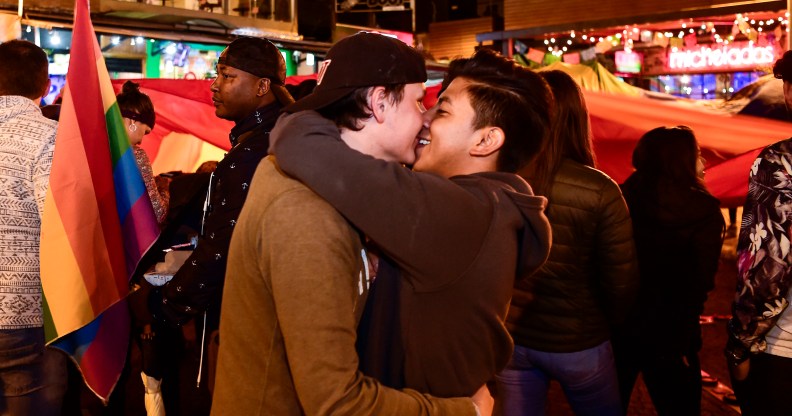Ecuador legalises same-sex marriage

People celebrates after the Ecuador’s Constitutional Court approved equal civil marriage, in Quito, on June 12, 2019.(RODRIGO BUENDIA/AFP/Getty)
People celebrates after the Ecuador's Constitutional Court approved equal civil marriage, in Quito, on June 12, 2019.(RODRIGO BUENDIA/AFP/Getty)
Ecuador’s highest court legalised same-sex marriage on Wednesday (June 12), ruling in favour of two gay couples who petitioned for the right to wed.
The constitutional court in Quito, the capital of Ecuador, voted five-to-four to approve same-sex marriage in the cases of the two men—thus extending gay marriage across the country.
Ecuador has a population of around 16 million people.
Ecuador approves same-sex marriage after lawsuit
One of the couples who won the right to wed are Efrain Soria and Javier Benalcazar.
According to AFP, Soria told reporters after the decision: “I want to say hello to Javier, who is in [the city of] Guayaquil. Honey, I love you.”
Soria also urged other LGBT+ people to “enjoy the happiness that comes from being equal, like anyone else.”
The four judges who ruled against same-sex marriage said that changes to the Ecuadorean constitution would have to be decided and approved by the government.
However, the constitutional court’s decisions are “binding and mandatory,” according to former supreme court president Gustavo Medina, reports AFP. That means public authorities officiating weddings must perform same-sex weddings.
Lawyer Christian Paula, who has provided legal advice to same-sex couples seeking to wed, told AFP: “It means that Ecuador is more egalitarian. It is more just than yesterday, that it recognises that human rights must be for all people without discrimination.”
Ecuador bans same-sex adoption
Ecuador has allowed same-sex couples to enter civil unions since 2008, however, same-sex couples cannot adopt children.
The South American country has recognised sexual orientation as a protected characteristic since 1998, making it illegal to discriminate against people for being lesbian, gay, bisexual or transgender.
Ecuador also banned conversion therapy in 2014.
The decision to legalise same-sex marriage follows other countries in South America, including Argentina, Brazil and Colombia.
Argentina legalised same-sex marriage in 2010, becoming the first to do so in Latin America, Brazil followed in 2013 and Colombia in 2016.

